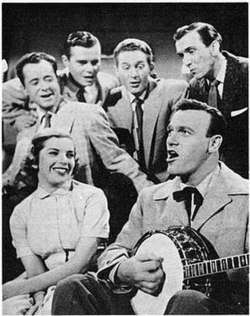Eddy Arnold Time
Eddy Arnold Time is an American musical television series syndicated to local stations from 1955 through 1957. The show consisted of 26 half-hour filmed episodes starring Eddy Arnold in different roles within a musical narrative. Arnold portrayed, among others, a lumberjack, a traveling salesman, a cowboy, a pet shop owner, himself, and even Stephen Foster.[1]
| Eddy Arnold Time | |
|---|---|
 The Gordonaires, Betty Johnson, and Eddy Arnold as themselves in the episode, "Sunday at Home" | |
| Genre | Musical |
| Written by | Ben Park |
| Directed by | Ben Park |
| Starring | Eddy Arnold Betty Johnson The Gordonaires |
| Opening theme | "Bouquet of Roses" |
| Country of origin | United States |
| Original language(s) | English |
| No. of episodes | 26 |
| Production | |
| Executive producer(s) | Joe Csida |
| Producer(s) | Ben Park |
| Production location(s) | Kling Studios, Chicago |
| Cinematography | Robert Sable Haskell Wexler |
| Editor(s) | Richard Hertel |
| Camera setup | Multi-camera |
| Running time | 30 minutes (26 minutes excluding ads) |
| Production company(s) | Csida-Grean Associates Eddy Arnold Enterprises |
| Distributor | Walter Schwimmer, Inc. |
| Release | |
| Original network | First-run syndication |
| Picture format | Black-and-white 35mm film |
| Audio format | Monaural Optical |
| Original release | January 1, 1955 – October 1957 |
Production and cast
Produced, directed and written by Chicago NBC veteran Ben Park, the series featured Betty Johnson, who usually played Arnold's romantic interest; and in supporting roles, the Jordanaires, using the name Gordonaires. A promotional booklet for the program explained that the group used the name Jordanaires "only for their recordings."[1] The more complete explanation is that it legally protected the producers in case the group, which owned the name Jordanaires, left the program prematurely. For this show, the group was composed of Hoyt Hawkins, Hugh Jarett, Neal Matthews, Jr. and Gordon Stoker. Guitarist Hank Garland and Roy Wiggins (steel guitar) also made occasional appearances. A young Ed Asner appeared in one episode.[2]
The producers termed the program, filmed at Kling Studios in Chicago, Illinois, a TV filmusical. Production began in October 1954; it was among the earliest syndicated American TV programs. Although popular in some small markets, it suffered from uninspired performances and storylines, a poor soundtrack and inadequate marketing.[3]
In 1959, episodes were edited together with segments from The Old American Barn Dance and Jimmy Dean's Town and Country Time (a local Washington, D.C. program) and syndicated by producer Bernard L. Schubert under the title, Your Musical Jamboree.[2]
Episodes (22 of 26)
|
|
Notes
- Eddy Arnold Time © 1955, Trinity Music, Inc., New York, N.Y.
- Gallen, Ira. "The Old American Barn Dance". Archived from the original on November 21, 2008. Retrieved January 19, 2009.
- Streissguth, Michael (1997). Eddy Arnold: Pioneer of the Nashville Sound. New York: Schirmer Books. ISBN 0-02-864719-X. p. 139
References
- Eddy Arnold Time © 1955, Trinity Music, Inc., New York, N.Y.
- Gallen, Ira. "The Old American Barn Dance". Archived from the original on November 21, 2008. Retrieved January 19, 2009.
- McNeil, Alex (1996). Total Television (4th ed.). New York: Penguin Books. ISBN 0-14-024916-8.
- Streissguth, Michael (1997). Eddy Arnold: Pioneer of the Nashville Sound. New York: Schirmer Books. ISBN 0-02-864719-X.